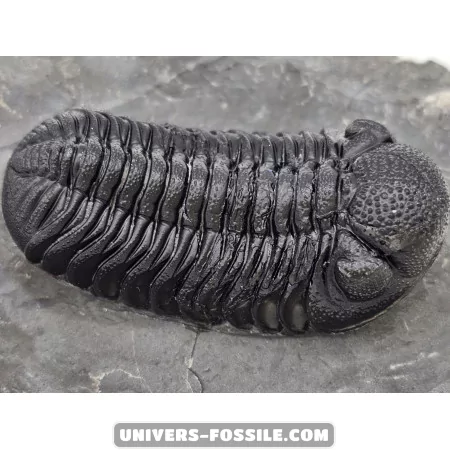Phacops Trilobites: Fossils from the Devonian Period - Trilobites

Phacops Trilobites
Discover the intriguing world of Phacops trilobites, a fascinating species that thrived millions of years ago. These prehistoric creatures, members of the arthropod class, offer a glimpse into an ancient era that continues to captivate paleontologists and science enthusiasts alike.
Origin and Evolution
Phacops trilobites inhabited the Earth during the Paleozoic era, around 400 to 450 million years ago. Thriving in the vast shallow seas that characterized the planet during that period, these creatures' segmented bodies and robust exoskeletons equipped them to flourish in diverse marine environments.
Anatomy
The distinguishing feature of Phacops trilobites is their segmented external exoskeleton divided into three distinct lobes. With their large compound eyes, these ancient organisms likely used keen eyesight to hunt for prey and detect potential predators in their surroundings. Their segmented appendages afforded them the agility needed to navigate the seabed with ease.
Habitat and Lifestyle
As benthic creatures, Phacops trilobites predominantly resided on the seafloor. Feeding on organic debris and small marine organisms found within the substrate, these creatures' swift movements enabled them to escape predators and thrive in their underwater world.
Phacops Trilobites
Phacops trilobites, fascinating ancient creatures that inhabited the Earth's seas millions of years ago, have left behind a legacy in the form of their well-preserved fossils.
Fossils
Fossils of Phacops trilobites are quite common in certain regions of the world, including North America and Europe. They are often found in sedimentary layers dating from the Devonian period, a geological period that spanned from 419 to 358 million years ago. Phacops fossils provide valuable insights to paleontologists about the biodiversity and evolution of ancient marine ecosystems.
Conclusion
Phacops trilobites are fascinating creatures that thrived hundreds of millions of years ago in the ancient seas of the Earth. Their fossils offer us valuable insights into prehistoric marine life and help us better understand the history of our planet. Their continued study continues to spark interest among scientists and enthusiasts of paleontology worldwide.
Whether it's their complex anatomy, intriguing lifestyle, or significance in understanding our geological past, Phacops trilobites continue to exert a lasting fascination on those interested in the ancient world around us.
